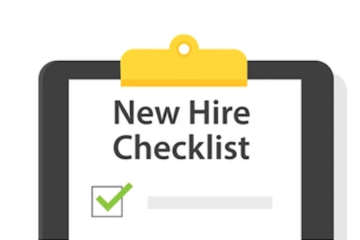Conducted correctly, background checks are a valuable component of the hiring process.
- Conducting background checks is an important part of building your team of employees.
- Background checks should only be conducted by legally compliant third-party providers.
- When done correctly, pre-employment background checks can give you some peace of mind that the person you are bringing into your company hasn’t been lying about their past.
A critical component of a comprehensive hiring process is conducting background checks on potential new hires. Background checks help you reduce the mystery in the hiring process and home in on candidates who have a higher potential to align with your needs and your company overall. However, to get the most out of the process, you need to conduct it properly, using the right services to guide you along the way.
What are pre-employment background checks?
Background checks are typically conducted during the pre-employment process for job candidates. Background checks for employment purposes typically reveal any convicted felonies and misdemeanors (for most states), judgments, and records from the FBI, Homeland Security, Drug Enforcement Administration, and National Sex Offender Registry databases.
Pre-employment background checks can also include education and employment verification. This ensures that the potential new hire went to the schools they listed on their resume and worked for the companies they listed as previous employers. You can also conduct reference checks at this time.
In some cases, you can also check a candidate’s credit background, including any history of bankruptcies. However, you should only include this information in a background check if there is a specific vocational need (e.g., for people working within finance) or an embezzlement conviction you want to learn more about.
A pre-employment background check searches for criminal convictions and other legal issues in a candidate’s past. It can also be used for educational and employment verification.
What types of background checks are there?
There are a few different types of employment-related background checks. The most common is the pre-employment background check. These can be conducted at any point during the hiring process, but they are most often done for candidates who have a contingent job offer.
The second type is when employers decide to conduct ongoing background checks on current employees. If you do this, there should either be a reason for the background check, such as a conviction of concern that has come to your attention, or a company policy that outlines how ongoing background checks are administered and how often. If you have a policy, ensure that it is clearly communicated to employees and executed consistently and fairly.
Whether you are screening potential new hires or current employees, there’s a wide range of searches you can run. Most background check services give you the option to pay for either a preset package of screenings or only the specific ones you want.
For example, a basic plan may include federal criminal searches, one statewide criminal search, a Social Security number trace, and a sex offender database check. More comprehensive plans may include additional statewide searches, education and employment verification, motor vehicle record checks, credit history checks, and drug tests.
There are two main types of employment background checks: those conducted during the hiring process and those conducted on an ongoing basis for current employees.
What are the benefits of employee background checks?
The benefits of pre-employment background checks typically sell themselves. Since roughly 53% of job candidates provide inaccurate information on their applications or in the interview process, background checks help ensure you are getting the truth from potential new hires.
There are several values adds to creating and maintaining a background check program for your company.
- Ensuring overall workplace safety: Background checks reduce violence and theft in the workplace by showing whether a candidate has a criminal history.
- Avoiding bad hires: Multiple factors play into what makes a good employee. Some criminal convictions are not violent but still offer some insight into the applicant’s character and trustworthiness within the workplace. It also ensures the candidate has been telling the truth about their past education and employment. If they lied about that, they might lie about other things once they are hired.
- Reducing liability and legal costs: The failure to vet new employees increases your liabilities and potential legal costs if there’s an incident involving an employee with a criminal history. One of the more serious liabilities is called “negligent retention,” which is when an employee claims their employer failed to terminate or discharge another employee who has caused some type of harm in the workplace.
- Ensuring position fit: In some industries and companies, certain jobs are considered high-trust positions, such as jobs that involve handling money or large budgets and armed security positions. Background checks that include financial scoring can help determine a candidate’s suitability for your chief financial officer or accountant position. Likewise, you do not want to give a sidearm to a candidate with a violent history for a security job.
Background checks are important for small and large businesses alike. Since there are no legal requirements for background checks, it is important to create a pre-employment background check policy and share it with all applicants.
How to run background checks and manage their results
Running your own pre-employment background checks, using whatever data you can find online, is not recommended. Your chance of being sued (such as for refusing employment to someone based on inaccurate information) increases if you don’t partner with a background check company that complies with the Fair Credit Reporting Act.
The FCRA is a federal law enacted in 1970. Its original intent was to help consumers resolve inaccuracies in their credit reports. Since then, it has expanded to include rules on how employers and other entities can pull personal information on applicants.
Here is a step-by-step process for running pre-employment background checks in a legal, fair and consistent manner.
1. Get legal advice, and check with your insurance.
It is always valuable to consult a lawyer before you decide to conduct pre-employment background checks. They can help ensure you move forward in the right direction. You should also take this time to contact your corporate insurance carrier and discuss your liability plan.
2. Develop a policy.
Under no circumstances should you begin this program without a well-reviewed company policy for conducting background checks. If you want to conduct ongoing background checks, be sure to include that information and potential causes for the checks in your policy.
3. Use an FCRA-compliant service that specializes in pre-employment checks.
Select a background check provider that complies with FCRA regulations. When you find a provider you are interested in, ask the company if its practices are FCRA compliant and to provide documentation supporting its claims.
4. Notify applicants.
You should tell all applicants upfront that your company conducts pre-employment background checks, drug screenings or other qualifying tests for employment at your company. This not only gives them fair warning but may also weed out applicants who know that a background check may disqualify them from consideration.
5. Make a contingent job offer.
It is important to conduct background checks only after you have extended a job offer. This is in relation to ban-the-box laws in California, Colorado, Connecticut, Hawaii, Illinois, Massachusetts, Minnesota, New Jersey, New Mexico, Oregon, Rhode Island, Vermont and Washington.
The ban-the-box law prohibits employers from asking applicants about criminal history on a job application (and, in some states, during an interview or prior to an offer of employment). Though most states don’t have this law, it is best practice to first make a job offer contingent on the successful completion of a background check.
6. Conduct the background check.
Every background check agency has its own process. Most of the time, all you need to do is log in to your provider’s secure website, fill out a few questions and submit the request. Checks typically take two to four days to complete, depending on how many specific screenings you are conducting.
7. Carefully review and consider the findings.
When you conduct the background check, thoughtfully review the information it uncovers. There may be convictions on the report, but how recent are they, and are they relevant to the job? For example, if a job applicant was charged with possession of marijuana 20 years ago and there is not much on the report since then, it’s probably fine to proceed with the candidate. However, if there are any sexual or other violent convictions, you should think through the ramifications of bringing this person on board. It may also be helpful to contact your attorney.
8. Follow up on results (particularly when you rescind an employment offer).
It’s OK to contact the applicant to ask follow-up questions. They should have an opportunity to clear their name, correct a misreporting, or provide context.
If you rescind a job offer, be ready to share the facts you found and why they matter. However, this is not meant to be a debate. Do not wait for the candidate to agree with you. Simply state the facts – for example, “I’m sorry, Mr. Smith, but a robbery conviction dating back two years does not provide us with enough confidence to move forward with your employment at this time.”
9. Be consistent.
Do not run background checks for some candidates and not others. For example, if you have a classification or type of job that has several openings and you screen one applicant for it, you need to screen everyone who has reached the same step in the hiring process.
10. Save your records.
You should keep your records for at least one year from the close of the job posting. Include records on anyone you’ve tentatively offered a job and screened. It is prudent to file these records away in case a former applicant inquires about their report, wants a copy of it or even sues your company.
Many websites offer additional guidance on pre-employment background checks, broken down by state laws (which are forever evolving).
When running background checks as part of your hiring process, you should have a clear policy in place, use a third-party background check service, consider only relevant information, discuss the findings with the applicant, and save your findings for at least a year.
What are the differences between self-run and third-party background checks?
If you want to run reliable and legal background checks on employment candidates, you need third-party involvement of some sort, typically a company specializing in background checks.
These companies are well versed in the process. They know the sources to turn to and have insights into which information may be inaccurate. Most importantly, they are FCRA compliant. This helps protect you from lawsuits concerning how the background check was conducted should an applicant feel they were treated unfairly.
You may be tempted to run a quick online “people search” on your own as a pre-employment background check. However, the vast majority of those sites are not FCRA compliant and clearly state in their terms of use that they should not be used to conduct pre-employment background screenings. Additionally, some of the information on those sites is inaccurate or outdated. So, if you use information from one of these searches to dismiss a candidate from consideration, they could bring legal action against you.
Key takeaway: You should only use professional background check services for your pre-employment screenings. They provide the most accurate information and comply with the FCRA, which is mandatory.
What are some third-party background check providers to consider?
Many companies offer pre-employment background screening services. These are some services that Business News Daily’s sister site business.com recommends:
- GoodHire: Specializing in small businesses, GoodHire offers comprehensive reports at a fair price point. It can customize reports and is FCRA compliant. Pricing generally ranges from $29.99 to $79.99.
- AccurateNow: A division of Accurate Background, AccurateNow can conduct a large variety of searches, such as professional license verification, motor vehicle reports, education and employment verification, and federal criminal searches. Pricing generally ranges from $29.95 to $74.95.
Other reputable companies to consider are InfoMart, Sterling, HireRight, and Pre-Employ.
You have a decent selection of reputable background check providers to consider, including GoodHire and AccurateNow.
What are employment reference checks?
There is a common misconception that checking employment references is the same as conducting a pre-employment background check. Although both are important, they are quite different things.
Employment reference checks are when you call the listed professional and/or personal contacts the applicant provided to confirm dates of employment, pay history, job title, nature of the job once held, and so on.
You can also use reference checks to confirm the character traits and work quality of the candidate by talking to their former or current colleagues, managers, clients, or even friends.
While reference checks are not the same as background checks, many background check companies include them in the process.
Reference checks involve speaking with those who can speak for the job candidate’s work performance or character. A reference check is not a background check, but it can be a component of one.


